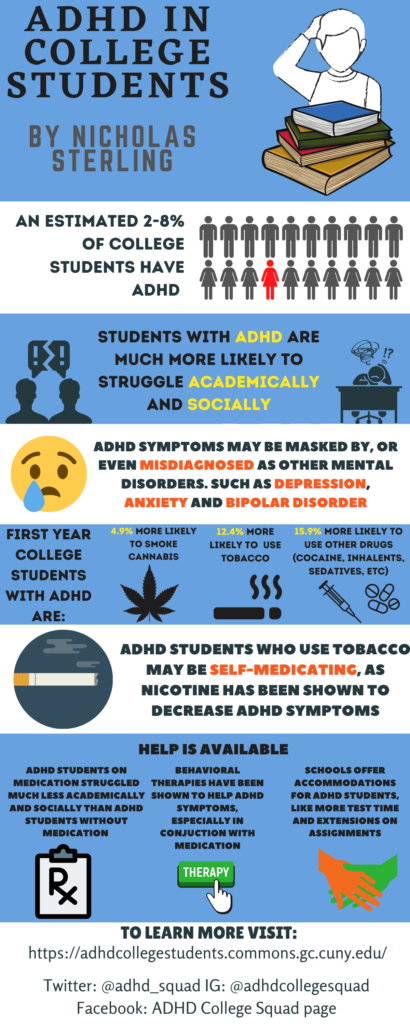Chattanooga, TENN. (mocsnews.com) – College students with ADHD often struggle with learning in school more so than the average student. They at times encounter issues with retaining spoken information, focusing, and productively managing their time which overall affects their motivation. ADHD can severely impact their studies but the right accommodations could help set the groundwork for future success.

ADHD, also known as Attention-deficit hyperactivity disorder, is a common and yet often misunderstood mental health condition. Symptoms include impulsivity, overactivity, and inattention — which are behaviors everyone has experienced. For people with ADHD these behaviors happen frequently and it affects their everyday life.
“Having ADHD in college is very difficult considering I am learning at a different pace than most students. Being in a classroom sitting still is hard for me. I am constantly readjusting the way I am sitting or dozing off in class” said Olivia Allen, senior at UTC.
There is no exact cause for ADHD but it does affect those throughout their entire lives. People who have the condition typically develop symptoms as adolescents or young adults. However it varies per person.
Andy Coyne, senior at the University of Tennessee at Chattanooga, said he noticed symptoms in the Fourth grade and Emma Covington, senior at UTC, said she noticed her symptoms late into her college career.
The condition does not affect how smart one is nor does it define a person’s behavior. Yet, it does strongly affect how one is able to focus. On average two students in every U.S. classroom have ADHD and it affects more than 6 million children.
According to the American College Health Association, the population of college students with ADHD has increased substantially as roughly one in nine college students today are diagnosed with the condition.
Covington has found that the condition has added unnecessary stress to her life due to the fact that without prescribed medication it was harder for her to stay engaged during lectures.
There are treatments, such as behavioral therapy and medication, that can help overcome the challenges of ADHD. Nevertheless, researchers have found that the best approach is when behavior therapy begins before prescription stimulant drugs, such as Adderall and Ritalin.
When asked if medication was needed Coyne replied, “I don’t think it’s needed but I think it is a very valuable tool. When I’m on it I am very focused. It doesn’t change who I am but it helps me be a better version of myself. I’ve struggled with school my whole life but up until college I could still manage to get by without my medication.”
Stress can quickly ramp up for college students facing the unique challenges that come along with ADHD and most times their condition seemingly is overlooked by universities.
“I wish resources were more widely advertised to students. I didn’t even know that was something I could get help for until last year. It’s nice to know that people on campus have my back and are actively advocating for me when I need it. For anyone who is struggling, the student outreach and disability center really changed how misunderstood I felt on campus”, said Covington.
People with ADHD can be successful in the long run when not only they work hard but their teachers support them for as long as is needed. Students at UTC who need help can feel free to contact the Disability Resource Center for academic accommodations.
 Mocs News Reporting the news that matters most to UTC
Mocs News Reporting the news that matters most to UTC




